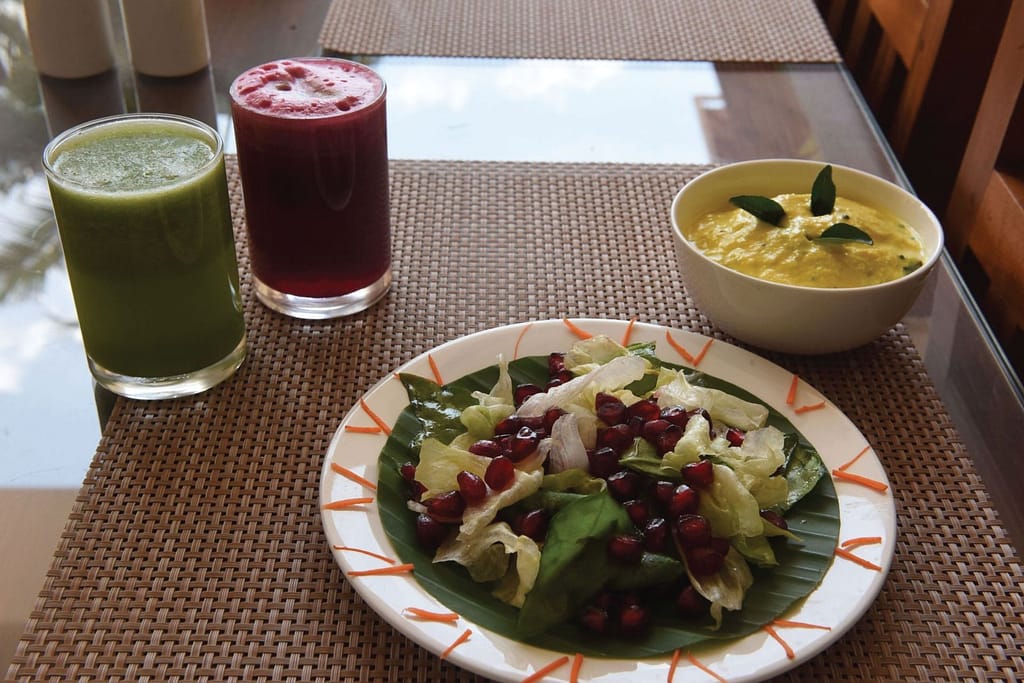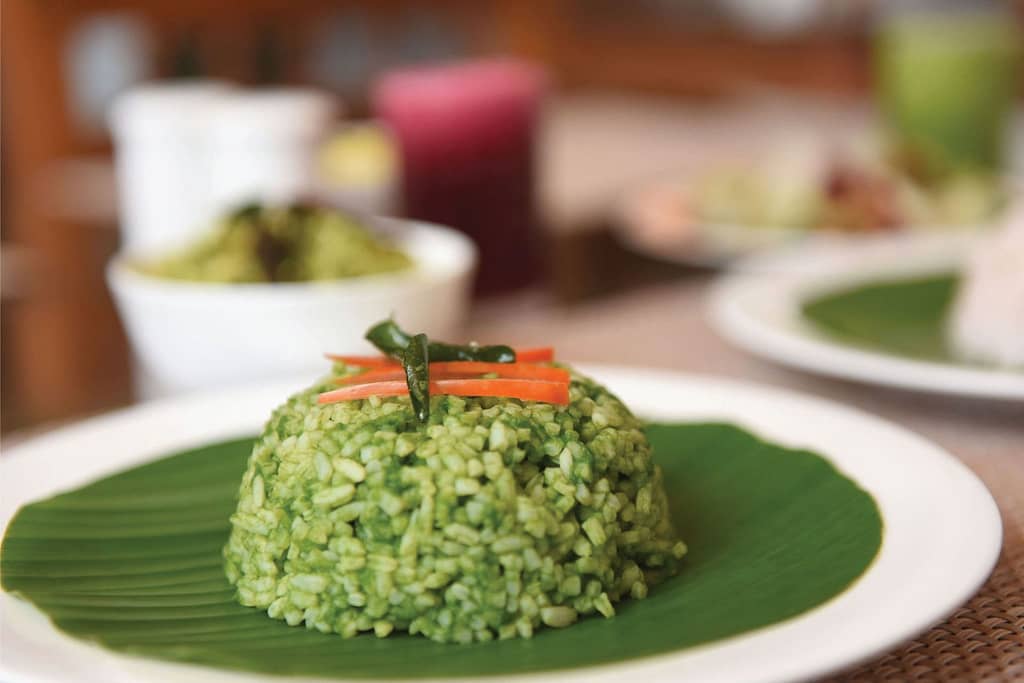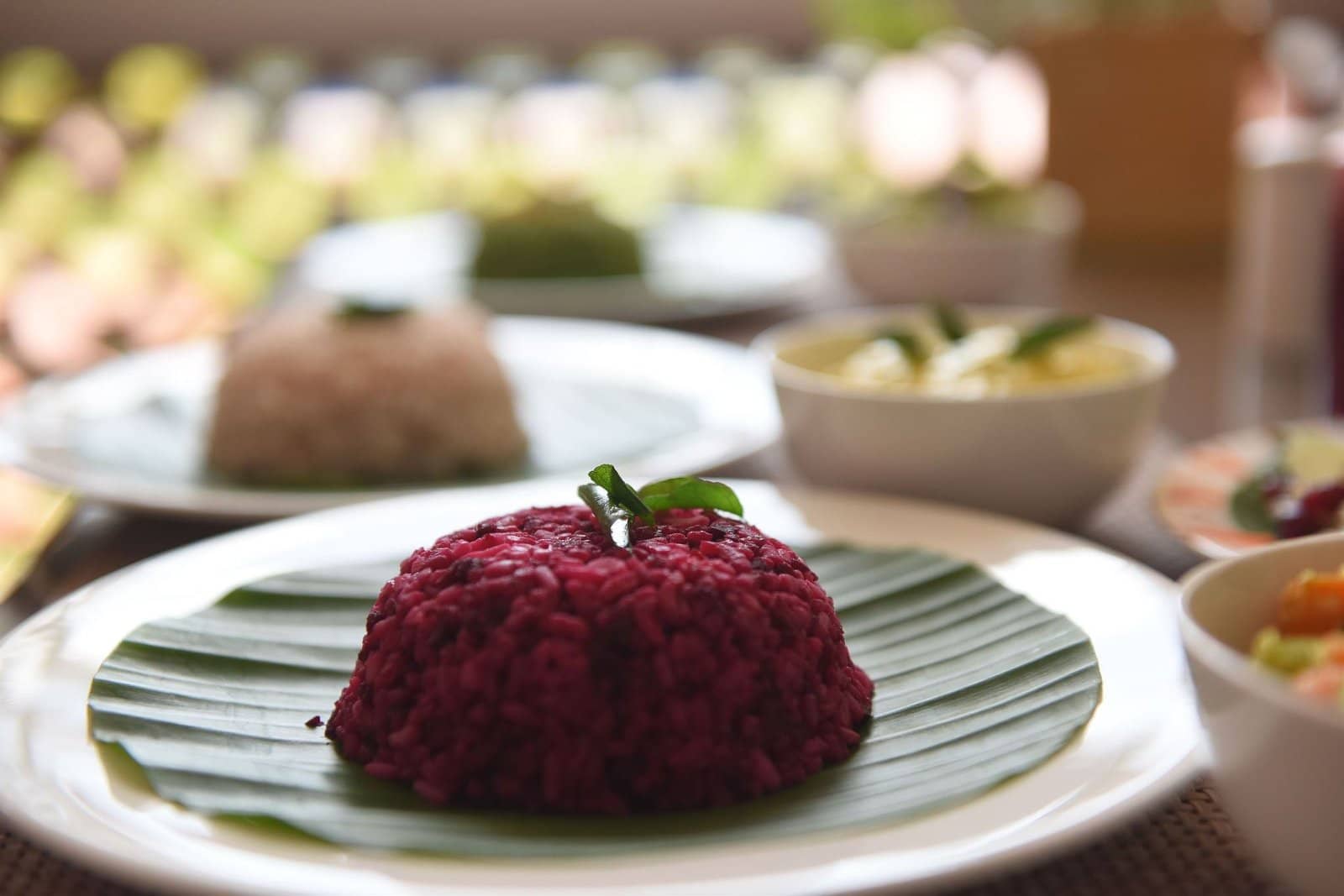AYURVEDA DIET
AYURVEDA DIET
wellness through proper diet, digestion and nutrition. The key to understanding food and nutrition for various body constitutions (prakriti) is an integral aspect of Ayurvedic cooking and eating. Nutrition plays a central role in Ayurvedic living. Ayurveda places special emphasis on “Ahara” (diet) and “Anna” (food) as a means to good life, health and wellness. Healthy and wholesome food nourishes the mind, body and soul.
Ayurveda asserts that although the digestive capacity of each person may be different, the quality and appropriate quantity of food are necessary for a healthy life. Food taken in proper quantity provides strength, vigour, good complexion and nurtures the health of the tissues. When we’re balanced, we desire foods that are good for us. But if our mind, body, or spirit is out of sync, our connection to our body’s inner intelligence goes awry.
The modern afflictions that affect our eating habits, like excessive consumption and fast-paced living, can be seen through the lens of the ancient science.
Pillars of life
Ahara is one of the three pillars of life according to Ayurveda, the other two being sleep and regulated sexual life. Prescriptions of consumption, food qualities and intake based on the digestive ability of an individual, and the nature of food that is being consumed. Primary classification of food is based on its appropriateness to body and mental constitution based on the five elements and the tridosa theories.
Ayurvedic Nutrition Principles
- Incorporating six tastes in each meal.
- Compatible and incompatible food combinations.
- Utilizing various spices and condiments to bring forth the healing qualities within foods.
- Consideration of seasonal changes.
- How to eat, cook, digest, assimilate, absorb and metabolize meals.
- Preparing foods according to individual constitution.
- Addressing various digestive imbalances – gluten, lactose intolerance, etc.
FOR HEALTHY DIGESTION
- Chew your food until it is an even consistency before swallowing.
- Do not eat while being distracted by television, excessive conversation or reading.
- Do not drink large quantities of liquid during meals, as this also weakens the digestive fire. A half-cup of room temperature water is about right, on the average. Dry meals may require more, and moist meals–like soup–require none at all
- Following your meal, relax for a short while to let your food digest before going on to the next activity.
- Allow three hours between meals to allow your food to digest.
- Digestion is strongest around noon, when the sun is at its peak. Therefore, it is best to eat your largest meal at noon. The morning and evening meals should be lighter.
- Take all water and drinks at room temperature or warmer. Cold drinks destroy the digestive fire and decrease digestion. This is true not only at mealtime, but all day long.
- Do not overeat, or eat right after a full meal.
- Starting the day with a glass of lukewarm water raises your body’s temperature, which speeds up the metabolism and aid weight loss too.
Improper Habits
SHADRASA CONCEPT

Ayurveda identifies six major tastes we need in our diet every day—sweet, sour, salty, pungent, bitter, and astringent. Each of these tastes has specific health-giving effects. By including all six, we will be most completely nourished and satisfied. When we consistently eat only a few of the tastes, it not only causes health problems but also triggers cravings for unhealthy foods. For instance, fast food contains mostly sweet, sour, and salty tastes. If we eat a steady diet of fast food, we can develop a craving for sweets of Ayurveda.
The six tastes also affect the doshas. Different foods cause specific doshas either to increase or decrease. The doshas increase and decrease on the principle of “like attracts like.” If you have a predominance of vata, you will have the tendency to accumulate more vata. Foods that decrease a dosha are said to pacify that dosha, and foods that increase it aggravate it. Sweet, sour, and salty foods pacify vata. Sweet, pungent, and bitter foods decrease pitta. Pungent, bitter, and astringent foods pacify kapha.
AGNI CONCEPT
Just as important as what we eat is how our body assimilates food. Food is the substance through which we bring nature’s intelligence into our bodies. Ayurvedic texts liken the process of digestion to cooking over a flame. Digestive “fires,” collectively called agni, “cook” food so that nutrients can be optimally utilized. When agni is strong, our body fully assimilates nutrients and eliminates what it doesn’t need. Ultimately a fully functioning digestive system uses the food we eat to produce a biochemical called ojas, a fluid substance that nourishes the mind and body, maintains the balance of all bodily systems, and fills one’s entire being with radiant bliss. If the digestive fire is weak, the incompletely digested portion of the meal forms a sticky, toxic substance called ama. The opposite of ojas, ama blocks the flow of the body’s inner intelligence.
It settles in areas of the body that are out of balance, taking on many forms, such as calcium deposits in the joints, plaque in the arteries, and cysts and tumours. A coated tongue, bad breath, dullness of the senses, depression, and unclear thinking can indicate the presence of ama.

AGNI CONCEPT

Vata
Excessive consumption of bitter, astringent and spicy tastes contribute to vata imbalance.
Vata pacifying with sweet, sour and salty tastes and warm, moist, easily digestible foods like: Boiled or steamed starchy vegetables (moderate broccoli, cauliflower, zucchini and leafy vegetables).
Eat at regular times, eat to less than full, practice relaxation, emphasise foods that are warm, soupy, heavy and oily, Ripe fruits, Warm milk (moderate dairy), Soupy grains: rice, wheat, Mild spices: cumin, ginger, cardamom, cinnamon, fennel, coriander, salt, cloves, mustard, black pepper, Tea: camomile, fennel, ginger, liquorice, lemon are good.
Reduce foods that are cold, dry or hard, avoid yeast, refined sugars, coffee, tea, tobacco, drugs, poor-quality oils and extremely spicy foods.

Pitta
Imbalance may result from excessive alcohol or hot, spicy, oily, fried, salty, fermented foods.
Pitta rebalancing with sweet, bitter and astringent tastes and cool, heavy foods including: include cooling aloe Vera juice daily, emphasise foods that are cool, refreshing and liquid (e.g. fresh fruits and vegetables).
Boiled, steamed, raw vegetables, Sweet fruits, Moderate amounts of dairy, Soupy grains: rice, wheat, barley, oats, Mild and cooling spices: coriander, cardamom, cloves, turmeric, cumin, curry leaves, mint, Tea: fennel, camomile, peppermint, spearmint, liquorice, red clover are good.
Avoid pungent foods, avoid alcohol, coffee, tea, yeast, chocolate, cheese, yogurt and meat, also avoid low-quality oils, which increase inflammation.

Kapha
Excessive food consumption can contribute to kapha imbalance, and recommends a light, warm, low-fat diet of pungent, bitter and astringent tastes like:eat only when you are hungry and not between meals emphasise foods that are light, dry or warm, include ginger in your daily diet: take a pinch of fresh ginger root with a few drops of lemon juice before each meal reduce foods that are heavy, oily or cold.
Boiled, steamed, raw vegetables, Ripe fruits (except banana), Fat-free buttermilk (other dairy reduced), Grains: corn, millet, rye, oats, barley, wheat bran, Strong spices: pepper, paprika, salt, garlic, basil, cloves, allspice, fennel, mustard, turmeric, cumin, ginger, cardamom, cinnamon, coriander, black pepper, Honey instead of sugar, Tea: cinnamon, fenugreek, peppermint, raspberry are good.
Avoid overeating, especially at night, do not eat raw or refrigerated foods, avoid yeast, salt, cheese, yoghurt, chocolate, refined sugars, flour, low-quality oils and meat.

Weight Loss Diet
- Ayurveda suggests some simple yet effective remedies to help you lose weight, the healthy way.
- Maintaining a healthy metabolism requires appropriate kindling of the digestive fire, which can be done by adding regular and reliable fuel to the body. So, eat healthy, digestible meals each day without snacking between meals to strike an important balance.
- Eating a light dinner (ideally before 7 pm) allows your stomach to empty itself before you go off to sleep and supports the natural detoxification processes that occur overnight. Add more soups and salads to your dinner to ensure proper cleansing of the system.
- Eating a kapha-pacifying diet helps to clear excess kapha from the system and may affect change in the body. Ideally, the kapha diet should include foods that are warm, dry, rough, light and digestible.
- Ama is said to be sticky in nature and can be easily dissolved with hot water. Try to have few sips of warm water first thing in the morning. You can add some fresh herbs like ginger to see effective results.
Organic Farming



All our food is 100% organic. As an Ayurveda village, it is our responsibility to ensure that our guests eat healthy. We strictly do not allow any kind of genetic engineering and antibiotic use in our food sources.
By choosing organic farming, we aim to serve our guests healthy meals that also tastes better comparatively and create a safer environment around us. The zero use of chemical fertilizers for cultivation keeps the soil and water sources around us less polluted, and the neighborhood healthy.
At our farm, we cultivate all kinds of fruits and vegetables suitable for the climate and geography of the Kovalam.

Discover transformation at Aadisaktthi Ayurveda Village: ancient wisdom, modern luxury, sea-view elegance, tailored Ayurvedic packages all in a serene ambiance for a life of positivity and supreme confidence
Quick Links
Ayurveda
Connect with us
Aadisaktthi Ayurveda Village LLP 227/A,K.S. Road, Vellar, Kovalam, Trivandrum,Kerala, India – 695527
info@aadisaktthiayurveda.com
+91 9633178787
+91 9633177722
